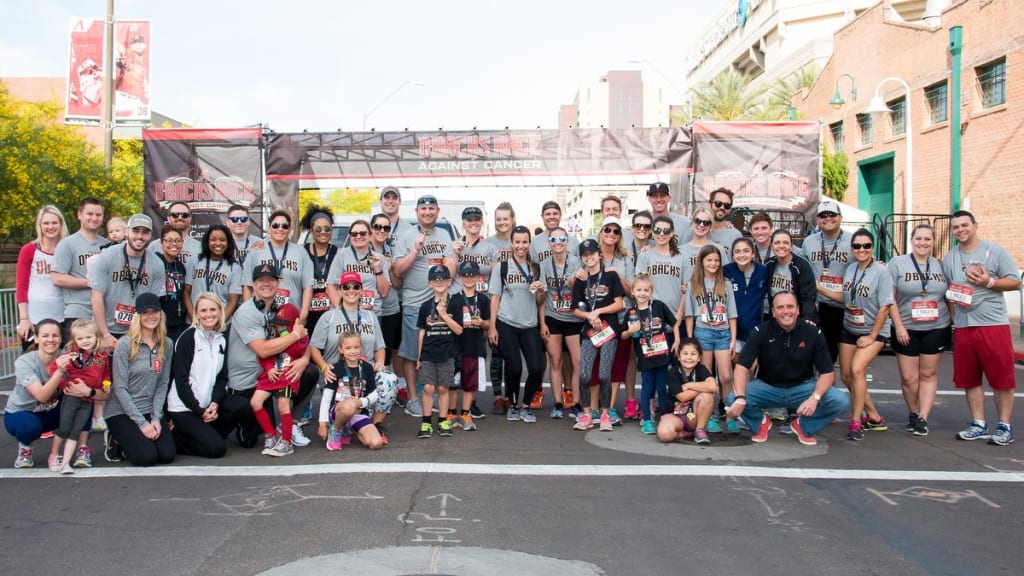
Derrick Hall had a personal connection. So did Toni Samora, Shane Carlin, Mark Wrobel and Jasmin Stefani.
All of them have been touched by cancer in their lives. That's why the fifth annual Arizona Diamondbacks Race Against Cancer on Sunday meant so such to them and the more than 3,000 runners and walkers who turned out on a bright sunny morning.
They came to support friends and family members who have been diagnosed with cancer and are undergoing treatment; to celebrate survivors and to remember those whose lives have been claimed by the frightening disease. Somehow, it seemed helpful and constructive to gather together, support one another, and raise money for cancer research, treatment and support.
"I am running for my friend right here," Shannon Vonnette said. "It's to support her and give back. It brings awareness to the disease. It affects everybody in different ways."
Vonnette was referring to Kimberly Smead, who suffers from triple negative breast cancer. Smead, a teacher at a Phoenix elementary school, was walking with Vonnette and other co-workers.
"I feel very fortunate to have this support from all of these people," Smead said. "When she says we are a family, we are. We all work at the same school."
Hall, president and CEO of the D-backs, is a prostate cancer survivor, and his late father died of pancreatic cancer. His wife, Amy, was diagnosed with the same form of breast cancer as Smead last year. Even new D-backs bench coach Ron Gardenhire, a longtime manager with the Minnesota Twins, has been diagnosed with prostate cancer.
Amy Hall has undergone seven months of treatment, a more grueling experience than Derrick Hall went through, according to Hall himself.
"She was going to the doctor with regularity," he said, unlike some men who are "too manly" or "too afraid" to get checked out. "All of a sudden, there was a lump. I almost fell backwards."
But after threatment, Amy was feeling better -- so much so that she attended the event and wanted to do the one-mile family walk.
Eventually, at her husband's urging, Amy decided to show her support without over-exerting herself. She has followed Derrick Hall's example by making her fight a public one, encouraging early detection and providing emotional support to other cancer patients.
"She's doing great. She's been an inspiration to me," Hall said. "We count our blessings that we were diagnosed early. The key to treatment is early detection."
Hall said Amy is a very private person normally and was reluctant at first to make her fight public, but quickly realized how his public campaign against cancer and early detection had helped him.
"If we can help others with our story, we should be screaming it out loud," he said.
Toni Luster participated in the walk with her son, Xavier Romero. Her father, Ralph Samora, who lives in Colorado, was recently diagnosed with liver, colon and stomach cancer.
"I am supporting the community and I am showing support for my dad," Luster said. "He needs to find support from the community. He needs to find survivors or people who are going through it."
Luster said that participating in the event was also giving her an outlet to deal with the bad news about her father's health.
"It's been such a horrible couple of weeks. I can find other people to talk to," she said.
Wrobel said his mother, Grace, 84, was doing the walk on her walker, despite five years of chemotherapy treatment on and off. A relative was following her with a wheelchair, a backup plan that angered her.
"A mile is a long way for an 84-year-old woman who has been through five years of chemo," Wrobel said. His mother was inspired after he recently ran the Los Angeles marathon in her honor.
Debbie Castaldo, the D-backs' vice president of community outreach, said sponsors paid for the event costs so that all entry fees can go directly to cancer research, treatment and support programs for victims.
More than 3,000 people participated in this year's race, which keeps growing every year. The event typically raises about $200,000 a year for the Arizona Diamondbacks Foundation, which makes contributions to such programs as the University of Arizona Cancer Center and Dignity Health.
"My mom and dad both died of cancer," Castaldo said. "This is a place where I put my passions. I look for causes that ease the suffering."
Stefani, a nurse practitioner who works with Dr. Kris Smith, a brain cancer specialist at the Barrow Neurological Institute, said patients with the disease used to survive for 13 months, but because of advancements, they are now living five to 10 years.
"I think it's amazing that so many people are supporting cancer and survivors," she said. "They are also being healthy doing it."